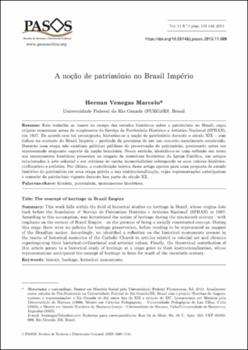A noção de patrimônio no Brasil Império
Author
Marcelo, Hernan VenegasDate
2013Abstract
Este trabalho se insere no campo dos estudos históricos sobre o patrimônio no Brasil, cujas
origens remontam antes do surgimento do Serviço de Patrimônio Histórico e Artístico Nacional (SPHAN),
em 1937. De acordo com tal pressuposto, historiou-se a noção de patrimônio durante o século XIX – com
ênfase no contexto do Brasil Império – partindo da premissa de ser um conceito socialmente construído.
Durante essa etapa não existiam políticas públicas de preservação do patrimônio, precisando antes ser
representado enquanto suporte da nação brasileira. Nesse sentido, identificou-se uma reflexão em torno
aos monumentos históricos presentes no resgate de memórias históricas da Igreja Católica, em artigos
relacionados à arte colonial e em crônicas de cunho memorialístico sobrepondo os seus valores históricocivilizatório
e artístico. Por último, a contribuição teórica deste artigo aponta para uma proposta de estudo
histórico do patrimônio em uma etapa prévia a sua institucionalização, cujas representações anteciparam
o conceito do patrimônio vigente durante boa parte do século XX. This work falls within the field of historical studies on heritage in Brazil, whose origins date
back before the foundation of ‘Serviço de Patrimônio Histórico e Artístico Nacional’ (SPHAN) in 1937.
According to this assumption, was historicized the notion of heritage during the nineteenth century - with
emphasis on the context of Brazil Empire - on the premise of being a socially constructed concept. During
this stage there were no policies for heritage preservation, before needing to be represented as support
of the Brazilian nation. Accordingly, we identified a reflection on the historical monuments present in
the rescue of historical memories of the Catholic Church in articles related to colonial art and chronics
superimposing their historical-civilizational and artistics values. Finally, the theoretical contribution of
this article points to a historical study of heritage at a stage prior to their institutionalization, whose
representations anticipated the concept of heritage in force for much of the twentieth century.





